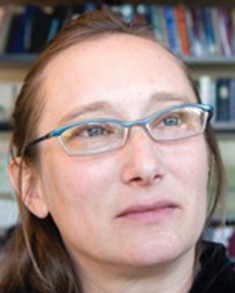Frydman’s protein-folding work
defines ‚Äėthe forefront‚Äô
, a professor at Stanford University, has won the . The award recognizes outstanding contributions to research in biochemistry and molecular biology.

“It is such an honor to receive the Merck award. Our work highlights how an incredibly elaborate network of chaperones controls and monitors every aspect of the life of proteins in the cell, from birth to death. The sheer elegance and complexity of this machinery, and its relevance for therapies for many misfolding diseases, make for an exciting challenge in years to come.”
— JUDITH FRYDMAN
Frydman has made discoveries in chaperone-mediated protein folding and protein quality control. Her work uncovered basic principles of chaperone function during de novo protein synthesis as well as during quality control, when protein misfolding occurs. Correct folding of cellular proteins is a fundamental problem in biology and is essential to human health. “Her work encompasses an impressive string of path-breaking discoveries,” said of the University of California, San Francisco, who nominated Frydman for this award.
Frydman’s postdoctoral mentor, at the Max Planck Institute of Biochemistry, recounts in his nomination letter how Frydman identified and characterized the eukaryotic cytosolic chaperonin complex TRiC/CCT system, including its structure and mechanism, in a series of publications from his laboratory. Frydman’s identification of TRiC as a eukaryotic chaperonin similar to, but distinct from, bacterial GroEL was a “tour-de-force and elucidated the fact that protein folding begins co-translationally in eukaryotic systems,” said the late Susan Lindquist of the Massachusetts Institute of Technology in her nomination letter of Frydman for this award. Hartl also said, “These studies are among the finest demonstrations of how one can dissect the mechanism of a complex macromolecular machine with a range of methods from biophysics, biochemistry and genetics.”
In her own laboratory at Stanford, Frydman is characterizing the process of protein quality control in eukaryotic cells. In a 2008 Nature paper, Frydman’s group showed that eukaryotic cells have distinct quality-control compartments that channel misfolded proteins to different cellular fates. This work relies on the sequestration of misfolded proteins into spatially and functionally distinct compartments, including a compartment that serves as a reservoir for subsequent protein repair/ubiquitination followed by proteasomal degradation and another compartment that sequesters terminally aggregated proteins.
Frydman’s work on protein homeostasis is also instrumental, as dysfunction of this machinery is associated with a growing number of human diseases. According to the late Lindquist, “her work holds important implications for a number of human diseases that result from misfolding of proteins, in particular neurodegenerative diseases.”
Frydman has approached her studies with an “enormous intellectual rigor and dedication to quality, and with a remarkable sense for biologically significant questions,” said Hartl. Walter further acknowledges that Frydman’s work encompasses “an innovative, comprehensive and most elegant integration of molecular chaperone function with cellular physiology and pathologies.” He adds that Frydman’s “work continues to define the forefront of a rapidly growing field, and her contributions mark significant milestones of our collective progress.”
Frydman has a Ph.D. in biochemistry from the University of Buenos Aires in Argentina. Frydman’s honors include the Distinguished Young Scholars Award from the W.M. Keck Foundation and the Merit Award from the National Institute of General Medical Sciences. She has organized and chaired a number of conferences on protein folding and homeostasis.
Frydman will receive her award during the 2017 91”įŅ‚Annual Meeting in Chicago, where she will deliver an award lecture. The presentation will take place at 8:45 a.m. April 26 in room W183ab in McCormick Place.
Enjoy reading 91”įŅ‚Today?
Become a member to receive the print edition four times a year and the digital edition monthly.
Learn moreGet the latest from 91”įŅ‚Today
Enter your email address, and we’ll send you a weekly email with recent articles, interviews and more.
Latest in People
People highlights or most popular articles

From dust to discovery
From makeshift classrooms in Uganda to postdoctoral research in Chicago, MOSAIC scholar Elizabeth Kaweesa builds a legacy in women’s health.

Fliesler wins scientific and ethical awards
He is being honored by the University at Buffalo and the American Oil Chemists' Society for his scientific achievements and ethical integrity.

Hope for a cure hangs on research
Amid drastic proposed cuts to biomedical research, rare disease families like Hailey Adkisson‚Äôs fight for survival and hope. Without funding, science can‚Äôt ‚Äúcatch up‚ÄĚ to help the patients who need it most.

Before we’ve lost what we can’t rebuild: Hope for prion disease
Sonia Vallabh and Eric Minikel, a husband-and-wife team racing to cure prion disease, helped develop ION717, an antisense oligonucleotide treatment now in clinical trials. Their mission is personal ‚ÄĒ and just getting started.

91”įŅ‚members recognized as Allen investigators
Ileana Cristea, Sarah Cohen, Itay Budin and Christopher Obara are among 14 researchers selected as Allen Distinguished Investigators by the Paul G. Allen Family Foundation.

AI can be an asset, 91”įŅ‚educators say
Pedagogy experts share how they use artificial intelligence to save time, increase accessibility and prepare students for a changing world.

